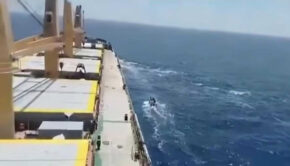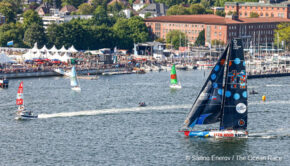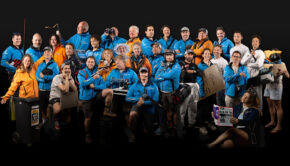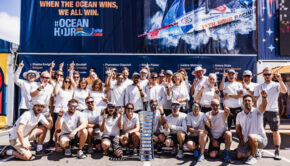Sophie Ciszek: Keeping The Flame Lit
Published on May 2nd, 2016
Picture this: you’re 30 years old, almost 31. You’ve just completed your first ever Volvo Ocean Race – and you scooped the ‘best rookie’ award in the process. You’re at your physical peak – fit, hungry and raring to go. Oh, and you’re female.
Meet Sophie Ciszek, one of the stars of the SCA campaign – the first all-female team to enter the Volvo Ocean Race since 2001-02.
She’s six foot tall. She can run faster, longer and harder than you. She can almost certainly lift more weight than you. So why is this young athlete, at the peak of physical fitness and full of motivation, on the verge of quitting the sport altogether?
“The Volvo Ocean Race was a whirlwind of fun – the pinnacle of where I want to be,” she explains, taking a well-earned break from helping out at the Boatyard in Alicante.
“It was exactly what I wanted to do – to learn. We achieved amazing things, and I learned what it takes to be a pro Volvo Ocean Race athlete.
“And then, well, it just ended. You go home and you just want to keep sailing, but it’s so hard to get a ride on boats.”
You’d think that with her award-winning pedigree, Sophie would have the offers piling up – but that’s not the case.
“It’s super frustrating. I went home to Australia after the race and it took me over a month just to find someone willing to put me on board in the Sydney-Hobart Race.
“It’s not easy. I’ve had a lot of ups and downs since the end of the Volvo Ocean Race,” she reflects.
“To be honest, I just don’t think that female acceptance in the rest of the sailing world is there yet.”
Ah, the gender debate. It’s a contentious issue – and whether or not the actual perception of women in the sport is changing is a case that has been, and will be, argued for some time to come.
But, let’s face it – the truth is that this isn’t a problem that Sophie’s male Volvo Ocean Race under 30 counterparts have struggled with.
“Half of the under 30 guys who did the Volvo Ocean Race have now moved on to the America’s Cup, or are sailing Maxis, TPs or super-yachts in the Caribbean.
“A lot of people seem to have the same old perception of women, whether that’s being not as experienced, not as strong, or whatever. I think that’s always going to be there, but you have to prove your own worth and what your skills are, and show the guys what you can do.”
She smiles. “It’s like surfing – you paddle out and you’re in a line up with 20 guys, and you’re the only girl. They’ll all drop in on you and take your wave, until you stand up and take a wave and show them you can surf.”
It’s not only sailing that finds itself under the spotlight. Recently, tennis superstar Novak Djokovic found himself at the centre of the debate after suggesting that women tennis players shouldn’t receive as much prize money as men.
Whether you agree with him or not, the fact is, when it comes to sailing, this isn’t even about how much you get out of the sport – it’s about how you get into it in the first place.
“The Volvo Ocean Race really taught me what my potential is, physically,” she explains. “There aren’t many girls out there who are my height and can be as strong.
“You have to just keep educating people and showing them what we did, and what we can do. You’ve got to keep going, you can’t give up. Things don’t happen instantly.”
It must be soul-destroying, working for so long, to reach the pinnacle of your sport and then being strung out, struggling to gain employment for seemingly no other reason than your gender.
Sophie nods. You can see in her expression that it’s a constant battle, and one that is taking its toll.
“I spent 10 years before the Volvo Ocean Race just pushing, pushing and pushing – and constantly being pushed back. I would have to fight just to get involved.
“I’d deal with people who weren’t very nice, I’d show up and work for free just to gain the experience. As women sailors, we all have.
“And then you get to sail the Volvo Ocean Race, and you’re competing at such a high level that afterwards it’s quite easy to get back into sailing at a lower one.
“But if you do that, you don’t keep learning, you don’t gain anything. I can’t go backwards – I need to keep the level high, keep improving and keep pushing.”
How hard is it, when you’ve committed a chunk of your twenties to a single campaign, to a race, to a single goal – to then switch back into civilian mode once you’ve crossed the finish line?
It must be kind of like being released from prison, I ask? “A little,” Sophie laughs.
“I was in the bubble for almost three years, and after that, even going down the aisle of the supermarket and cooking your own food is weird. The routine you’re in when you’re on the team is so regimented and repetitive – it’s two completely different lifestyles.
“Mentally, you’re in a different rhythm from everyone else. Your friends and family all have nine to five jobs, they’re getting married and having kids, just doing the normal thing. Meanwhile, you’re off doing this thing that a lot of people just don’t understand. When do you step out of that bubble?”
“I know that the next race is the one for us to aim for – we still have some momentum. Now, I just really want to go again. There comes a time when you have to stop saying we could do better in this or that, and just go and do it,” she says, emphatically.
“I’d be lying if I didn’t say that, yes, sometimes I have thought that maybe I should just go back to a ‘normal’ life. I’m qualified in physical therapy – so do I just go and get a job in a clinic, come home every night, sleep in my own bed?
“But there’s too much fire in the belly for that right now. I really, really want to do the next race. It’s the ideal platform for me – I don’t have kids, I don’t have responsibility, I can completely focus on it.”
It’s about taking that chance, seizing the day, maintaining momentum. And that’s exactly what the SCA girls are trying to do, through the Magenta Project – a collective they founded in order to try to find a new sponsor, and continue the legacy of their 2014-15 Volvo Ocean Race campaign.
“A lot of people think that the Magenta Project is a sponsor, but it’s not,” Sophie explains. “It’s actually just a name for us as a collective project. We’re all putting in the hard yards to try to find a new sponsor.
“A lot of people are interested and aware of what we did – but the fact is that we haven’t got another sponsor lined up yet.”
Sophie made serious progress last race – and her personal journey was made tangible, when she was awarded the prestigious Hans Horrevoets Rookie Award at the race finale in Gothenburg.
The trophy, which is given in memory of the late Hans Horrevoets, is awarded to the outstanding young sailor of each race.
“The Rookie Award was an amazing thing to receive,” she smiles. “It proved to me that I had reached the level that I thought I had, and that people had noticed and believed in what I’d done.
“Before that, I always felt like I was a normal person and I was surrounded by these amazing athletes. I learned that’s not the case – I was training in the gym alongside tons of Olympians, and then I would come in as number one on the fitness test, and I was like ‘whoa’! It shows that you can become whatever you want to become. You can achieve anything.”
When she stops to reflect on her journey, it’s almost surreal, she explains. “I was sailing alongside a bunch of my heroes. I’d followed Sam Davies for ages – she was sponsored by Roxy on one of the Vendée Globes and as a young surfer chick I thought that was the coolest thing ever! She combined my two loves.
“And in the race, she was huge for me onboard – she had a lot of responsibility and a lot of different skills. I could see the pressure she had on her shoulders. I especially noticed down in the Southern Ocean that Sam, Liz (Wardley) and Dee (Caffari) had so much knowledge and experience. I loved being around them, I couldn’t get enough of it.”
So, what’s the future for women in sailing, and in the Volvo Ocean Race? We waited for more than a decade between female campaigns – does Sophie think we’ll have to wait another 10 years?
“I really hope not,” Sophies replies. “I’ve been working with a lot of schools and sailing clubs since the race ended, and everyone loves our story. In fact, I just did a girls’ sailing day in Victoria, Australia, and there were a couple of hundred young females who turned up – it was really inspirational.
“That’s important, and I know, because I had the same experience as a kid. Ellen MacArthur was my hero. I had all of the videos at home, and used to watch her on the VCR. It was huge experience for me.
“And now Mark (Turner, the new Volvo Ocean Race CEO, who was Ellen’s business partner during her campaign) is heading up the race! It’s reassuring, and I hope it will help us along a little bit as female sailors. It feels like we’re moving forward, but there’s still a mountain to climb.
“The more we can spread the word, the better. We need all the help we can get.”
Source: Volvo Ocean Race









 We’ll keep your information safe.
We’ll keep your information safe.